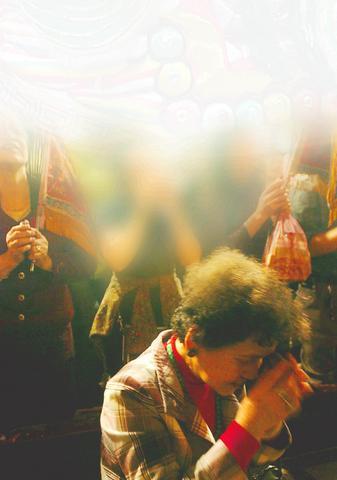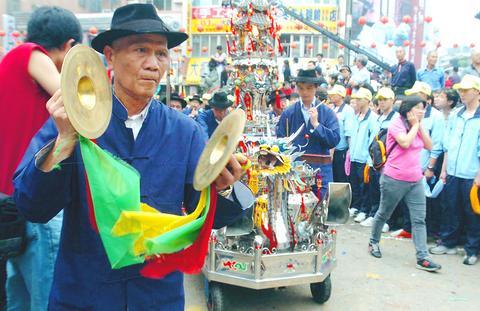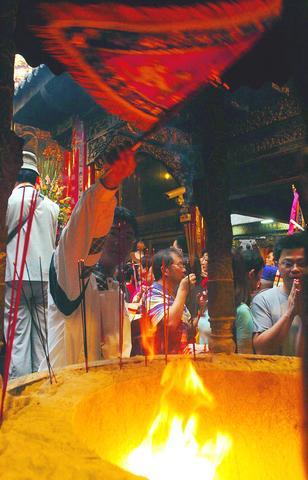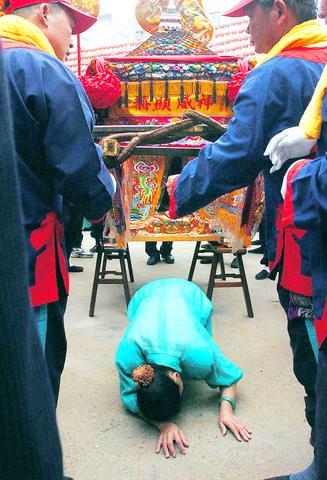At 10:10pm last night the narrow streets adjacent to the Jenlan Temple
The normally sleepy town was transformed into a giant, all-day night market, with crowds shoulder to shoulder in a chaotic jumble that inexplicably moved in the right directions. At one point yesterday afternoon, President Chen Shui-bian (

PHOTO: CHIANG YING-YING, TAIPEI TIMES
Originating in China during the Qing Dynasty (1644-1911), the pilgrimage was outlawed by the Japanese in Taiwan during their occupation between 1895 and 1945. Although local farmers and fishermen began their own mini-Matsu pilgrimage shortly after the surrender of the Imperial Japanese Army on Taiwan in 1945, the pomp and circumstance that surrounds today's pilgrimage began in earnest in 1987, when a reported 100,000 people participated in the event.

PHOTO: CHIANG YING-YING, TAIPEI TIMES
Since then, the pilgrimage has gone from strength to strength and now attracts hundreds of thousands of participants and is watched by over a million onlookers as it crisscrosses west-central Taiwan. It lasts for eight days and seven nights and passes through 53 towns in three counties. By April 25, when the thousands of devotees who choose to follow the pilgrimage's round-trip journey through the countryside and back to Jenlan Temple, which is run by controversial independent legislator, Yen Chin-piao
Along the way, well over a million people will have witnessed the procession as it passes by their homes to mark the 1,118th anniversary of Matsu attaining the status of a goddess.

PHOTO: CHIANG YING-YING, TAIPEI TIMES
"The festival gets bigger every year and now it's impossible to put a number on the amount of people who take part in it. [Matsu] is one of the most revered gods not only in Taiwan, but all around the world," said Yen. "People from local communities participate. People from all over Taiwan come, as well as visitors from Japan, China and other countries."

PHOTO: CHIANG YING-YING, TAIPEI TIMES
The pious, travelling on foot, bicycle, scooter and in cars, follow the goddess' effigy, which is carried at shoulder height by groups of bearers for the entire journey. Every year, the pilgrimage brings with it horrendous traffic congestion.
Delays are commonplace, yet worshippers and the curious alike are happy to wait several hours just to catch a glimpse of the goddess that has become the nation's semi-official patron saint.
Yesterday, Tachia's main drag and all the roads leading to the Jenlan Temple were completely blocked and are set to remain so until the pilgrimage finally begins snaking its way toward Nanyao Temple
The Heavenly Mother, or the Goddess of the Sea, as Matsu is often referred to in Taiwan, is thought to have originally been a woman named Lin Mo-liang who lived in China during the Song Dynasty (960-1127).
"Along with being the Goddess of the Sea, Matsu is also the Goddess of virtue and righteousness. Although Taiwan's people may worship many different gods and follow many different paths, Matsu unites them and is revered by all," said Cheng Ming-kun,
More than religion
Once a purely religious event, the annual pilgrimage has become politicized and been turned into a tourist event and a media circus in recent years.
The Taichung County Government officially named the pilgrimage the Tachia Matsu Cultural Festival
It all may sound like hell rather than a religious festival centered on peace and harmony, but Tachia residents such as Lee Fong-yin
"It has its drawbacks, sure, but Tachia is not a rich town and the event brings in thousands of money-spending outsiders all of whom have to eat, drink, sleep and spend money," said the taxi driver. "I earn more money ferrying people to and from the town at this time of year than I usually earn in a week, or maybe two. Last year I made over NT$8,000 in about six hours."
Politicization and tourism aside, the pilgrimage is still overseen by the numerous temples and related organizations. Uniformed groups and temple employees composed of middle-aged women and large numbers of thuggish-looking types direct traffic as best they can and ensure that the nobody is injured in the melee that follows directly in the palanquin's wake.
Trouble in the name of religion
While the untrained and unsupervised temple groups wield some control over the proceedings and try to maintain the pilgrimage's congenial and festive atmosphere, trouble often erupts.
The most volatile aspect of the pilgrimage is when the palanquin passes from one district into another and the bearers change. Rival gangs with stronger mob ties than religious beliefs often start scuffles over which group has the right the bear the effigy of Matsu on whose turf.
While one heavily tattooed temple official, who declined to give his name, explained that such behavior was expected and that "it is because they are true devotees and wish to prove this to the goddess," the "high-spirited" fracases have been known to spiral out of control.
Last year, members of various Eight Generals
"This year there will not be any trouble. We've told the different groups that such acts hurt everyone. We have a list of those who have been banned from participating and they will be arrested if they try to cause trouble," said Yen, who is rumored to have once been a leading gangland figure himself. "Not only were the pilgrims not happy, but Matsu is a goddess of peace and she frowns on anyone who pursues a road of violence".
Specialists in a form of "temple-procession art" that combines self-flagellation with martial arts and dance, Eight Generals groups traditionally acted as religious policemen entrusted with the task of arresting evil spirits. In recent years, however, many of the groups have become coopted by gangs and now attract tattooed, teenage gangster wannabes.
With large numbers of people armed with obsolete, yet deadly weaponry and overcome with religious fervor and drunk, Yen's words may fall on deaf ears. Yet, even if violence erupts again, Yen doesn't think it will hurt the festival, but will instead only hurt those who engage in violence.
"The pictures were broadcast nationwide, but I don't see any drop in the number of people coming here or being put off by what they saw," he said. "People know that the bad element will be punished by Matsu."

On April 26, The Lancet published a letter from two doctors at Taichung-based China Medical University Hospital (CMUH) warning that “Taiwan’s Health Care System is on the Brink of Collapse.” The authors said that “Years of policy inaction and mismanagement of resources have led to the National Health Insurance system operating under unsustainable conditions.” The pushback was immediate. Errors in the paper were quickly identified and publicized, to discredit the authors (the hospital apologized). CNA reported that CMUH said the letter described Taiwan in 2021 as having 62 nurses per 10,000 people, when the correct number was 78 nurses per 10,000

As we live longer, our risk of cognitive impairment is increasing. How can we delay the onset of symptoms? Do we have to give up every indulgence or can small changes make a difference? We asked neurologists for tips on how to keep our brains healthy for life. TAKE CARE OF YOUR HEALTH “All of the sensible things that apply to bodily health apply to brain health,” says Suzanne O’Sullivan, a consultant in neurology at the National Hospital for Neurology and Neurosurgery in London, and the author of The Age of Diagnosis. “When you’re 20, you can get away with absolute

May 5 to May 11 What started out as friction between Taiwanese students at Taichung First High School and a Japanese head cook escalated dramatically over the first two weeks of May 1927. It began on April 30 when the cook’s wife knew that lotus starch used in that night’s dinner had rat feces in it, but failed to inform staff until the meal was already prepared. The students believed that her silence was intentional, and filed a complaint. The school’s Japanese administrators sided with the cook’s family, dismissing the students as troublemakers and clamping down on their freedoms — with

As Donald Trump’s executive order in March led to the shuttering of Voice of America (VOA) — the global broadcaster whose roots date back to the fight against Nazi propaganda — he quickly attracted support from figures not used to aligning themselves with any US administration. Trump had ordered the US Agency for Global Media, the federal agency that funds VOA and other groups promoting independent journalism overseas, to be “eliminated to the maximum extent consistent with applicable law.” The decision suddenly halted programming in 49 languages to more than 425 million people. In Moscow, Margarita Simonyan, the hardline editor-in-chief of the